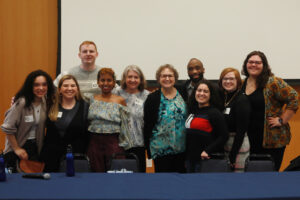The Honors Program at the University of Mary Washington asks much from its participants. But the high-achieving, intellectually curious students admitted into the selective program say everything they do as Honors Scholars rewards their efforts many times over.
That was the overwhelming message from eight program alumni and several current participants as the UMW Honors Program celebrated its 10th anniversary Saturday, March 25, with a panel discussion, video and reception at Seacobeck Hall.

Conceived as a way to recruit top achievers out of high school – and keep them engaged and enthusiastic during their full four years at Mary Washington – the Honors Program began in the 2012-13 academic year with a goal of admitting 50 qualified students. Seventy-five signed up, recalled Professor of Chemistry and Honors Program Director Kelli Slunt, and the Honors Program has exceeded expectations ever since.
“The program is thriving, and I’m just so thrilled with all the changes that have happened in the past 10 years,” Slunt told the audience gathered in Seacobeck’s Weatherly Wing. Key to that success, she said, has been the addition of Professor of English Mara Scanlon as associate director and Kasey Morello as program coordinator. Scanlon coined the program’s motto, “Be More,” and it couldn’t be more apt.
Admission to the Honors Program is based on grade-point average, rigor of high school curriculum, test scores if submitted, and personal essays. Slunt and Scanlon say that, in addition to achievement, what they seek in Honors students is curiosity in and out of the classroom. Once in, Honors Scholars embark on a supercharged college experience.
Through the years they take at least 12 credits in honors-designated classes, participate in honors service learning, meet a leadership requirement, write reflective essays, and complete a capstone project. They plan field trips to broaden their experience of the arts, government, and other spheres. And they bond with one another during program events and study sessions in the Honors Commons in Lee Hall at the center of campus. All the while they maintain at least a 3.2 grade-point average.
Most Honors Scholars are admitted straight out of high school and arrive on campus one week before classes start. They participate in City as Text, a trademarked National Collegiate Honors Council experiential learning initiative that immerses them in the history, geography and culture of Fredericksburg. All UMW students can experience the Honors Program by enrolling in Honors-designated classes or applying for admission to the program after they begin their studies.
It all adds up to a “Be More” experience that yields benefits in college and well beyond, the eight panelists who spoke on Saturday agreed.
Panelists representing each of the Honors Program’s past graduating classes were: Alaina Haws ’15, a historic preservation and music studies major now working as a writer of robotics and computer science curricula; Kathryn Hall ’16, an English major now teaching middle-school English at a private boys’ school; Zaire Sprowal ’17, a physics major now in a physics doctoral program at the University of Rochester; Marina Casto-Meirelles ’18, a political science major and contemplative studies minor pursuing a master’s degree in behavioral sciences; Milen “Mili” Mehari ’19, a double major in English and women’s and gender studies now in an African studies doctoral program at Howard University; Joey Opiekun ’20, a finance and English: creative writing double major now working as a registered investment advisor; Piper Giannini ’21, an English: creative writing major and digital studies minor now working for the Defense Intelligence Agency; and Sydney Baylor ’22, an American studies major pursuing a master’s degree at William & Mary.
Asked about the ways the Honors Program changed them, panelists mentioned learning how to solve problems, meet deadlines, challenge themselves, blast through their comfort zones, take ownership of new situations and question assumptions. Even failure taught a lesson – how to gain wisdom from the experience and build on every step in the right direction.
But asked for favorite memories of the program, nearly everyone came back to the idea of forming valuable personal and professional connections.
Giannini, whose college years coincided with the pandemic shutdown, said the Honors Program was “a guide, a light through the darkness” providing a steady to-do list and socially distanced camaraderie. Opiekun noted a key connection with Scanlon, who challenged him to read fast and fearlessly and, after graduation, attended his wedding.
Mehari mentioned finding kinship among people who understand and share academic drive and determination. Hall said she made lifelong friends with program peers, several of whom were in that Saturday morning audience.
Casto-Meirelles drew on a memory of Provost Tim O’Donnell saying success in college isn’t defined by the number of extracurriculars or taking on a second major, but by who meets whom and when they meet.
Those vital personal and professional connections are key to the Mary Washington experience overall, but in the Honors Program they’re enhanced – just one more way Honors Scholars challenge themselves to “Be More.” For more information, visit the Honors Program website.


